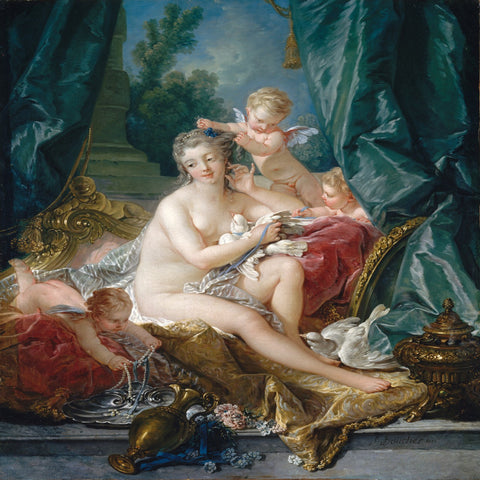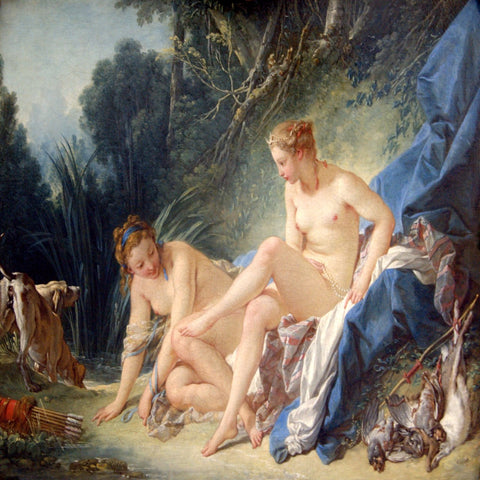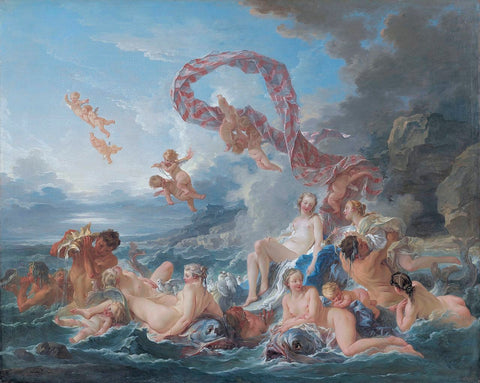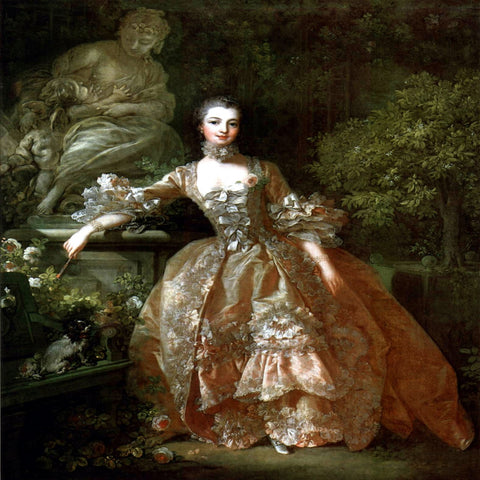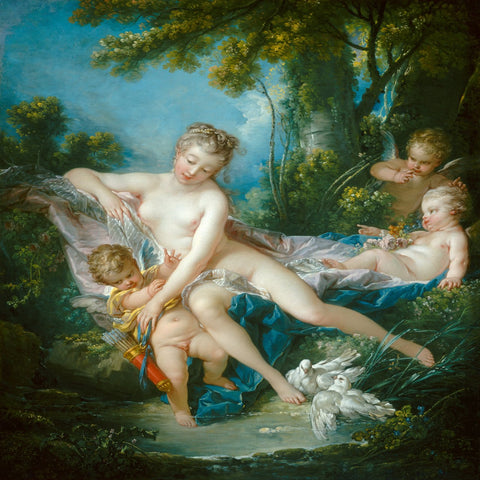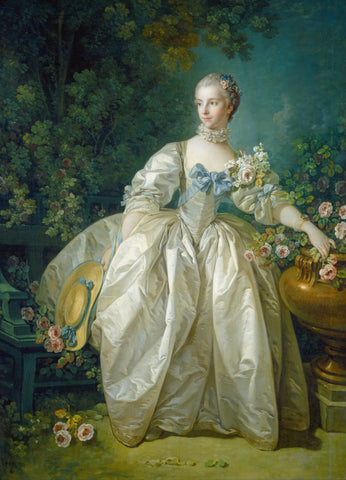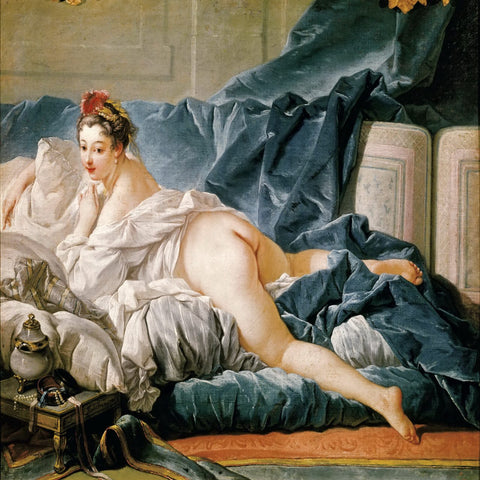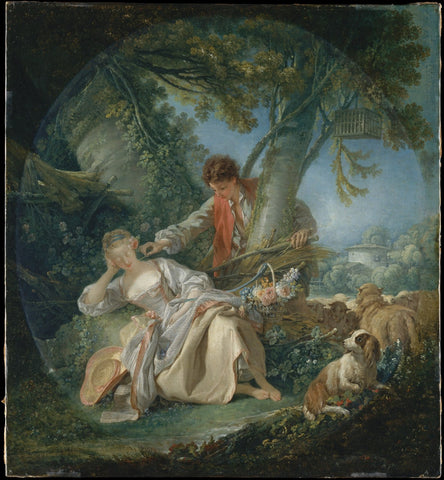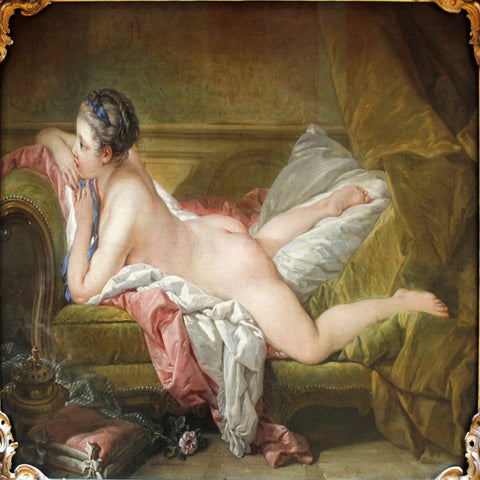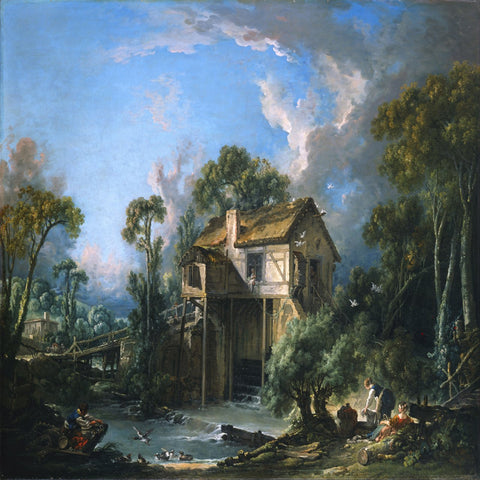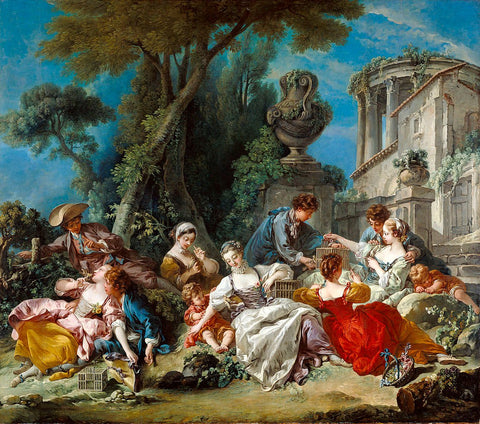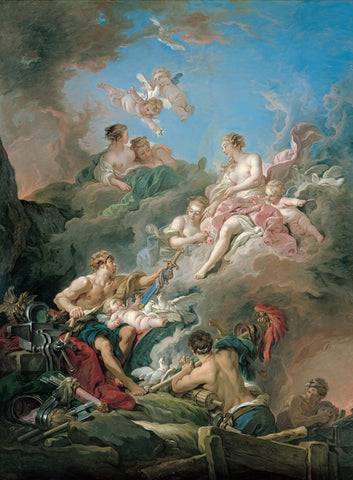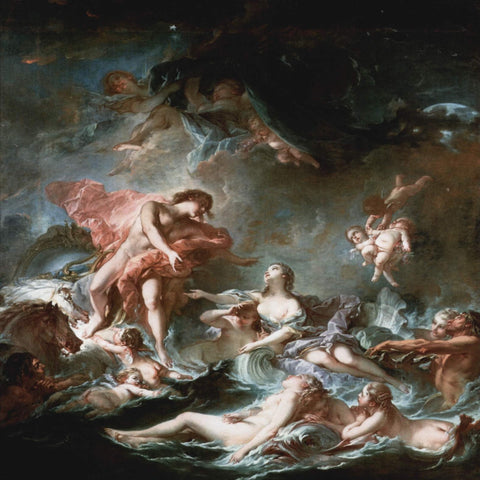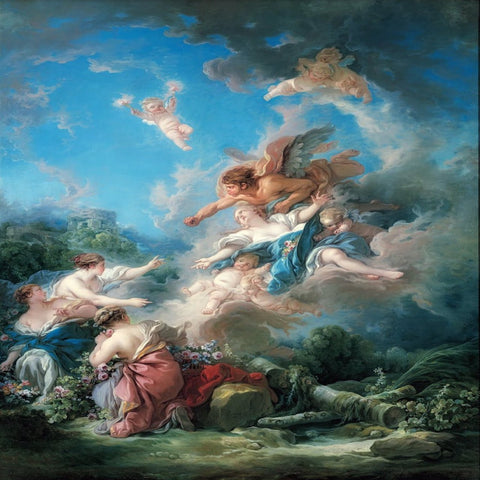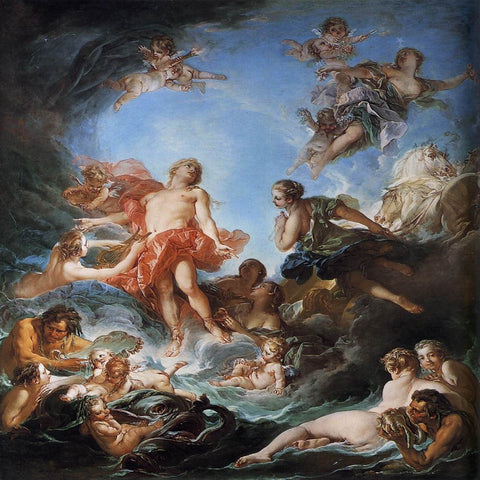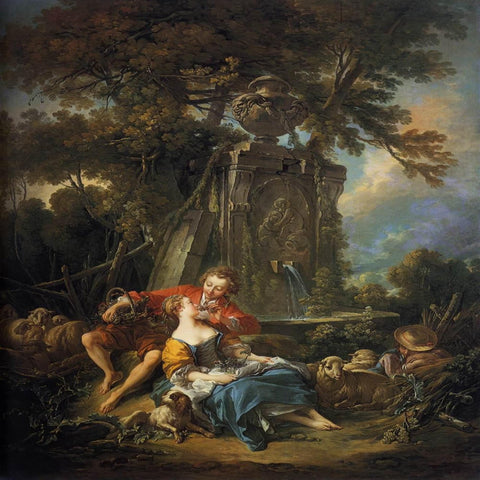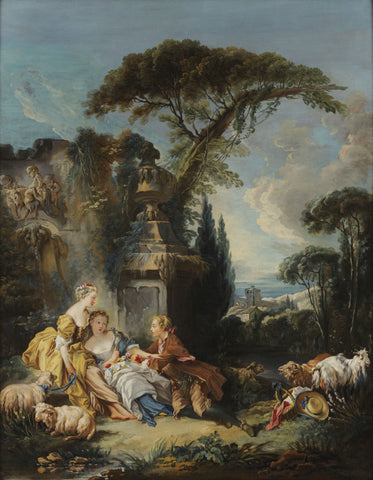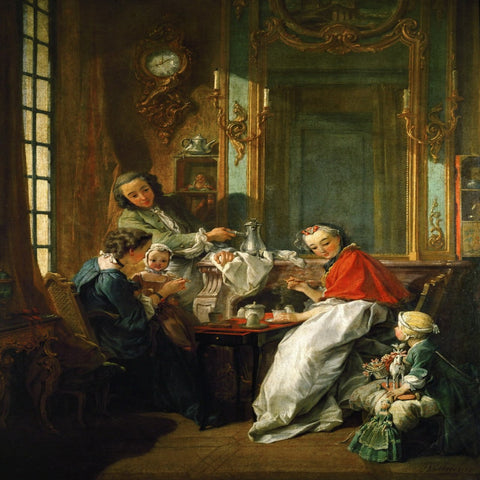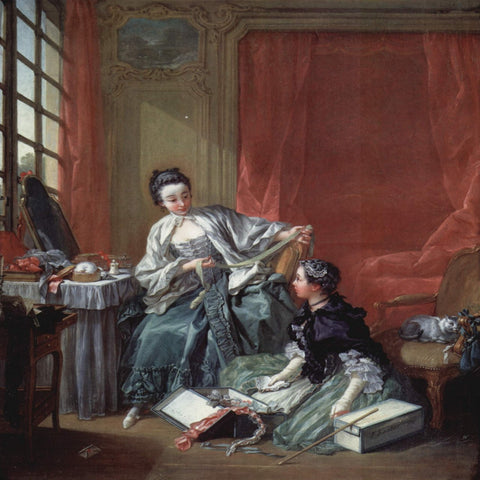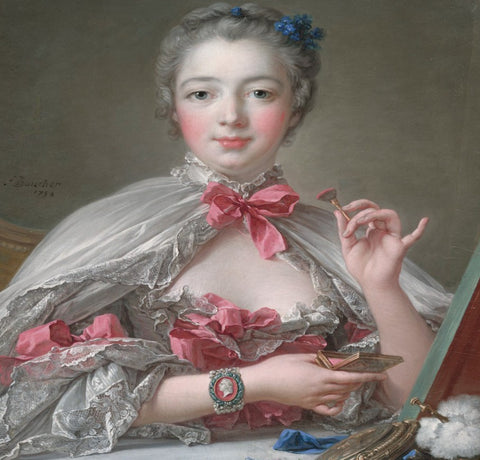Francois Boucher Most Famous Paintings
Who was François Boucher?
François Boucher was a French painter, draftsman, and etcher, who worked in the Rococo style. Boucher is known for his untainted and curvaceous paintings on classical subjects, ornamental anecdotes, and peaceful scenes. He was maybe the most acclaimed painter and embellishing artist of the eighteenth century.
Here is a list of François Boucher's most famous paintings:
- The Toilet of Venus by François Boucher
- Diana after the bath by François Boucher
- The Triumph of Venus by François Boucher
- Portrait of Madame de Pompadour by François Boucher
- Vulcan Presenting Arms to Venus for Aeneas by François Boucher
- Venus Consoling Love by François Boucher
- Madame Bergeret by François Boucher
- The Brunette Odalisque by François Boucher
- The Interrupted Sleep by François Boucher
- Portrait of Marie-Louise O'Murphy by François Boucher
- Mill at Charenton by François Boucher
- The Bird Catchers by François Boucher
- Venus at Vulcan's Forge by François Boucher
- The Setting of the Sun by François Boucher
- Boreas Abducting Oreithyia by François Boucher
- The Rising of the Sun by François Boucher
- An Autumn Pastoral by François Boucher
- Pastoral scene by François Boucher
- The Breakfast by François Boucher
- The Milliner by François Boucher
- Madame de Pompadour at her Toilette by François Boucher
Francois Boucher Artworks
The Toilet of Venus by François Boucher
Boucher executed this painting for Madame de Pompadour, the wondrous, fancy woman of Louis XV.
Madame de Pompadour was Boucher's most noteworthy benefactor from 1747 until her passing in 1764. It initially beautified the washing quarters (an extravagant suite of three rooms) in Pompadour's Château de Bellevue.
After the château was built it prompted a number of noteworthy commissions of Rococo-style paintings. Boucher emphasizes an unmistakable scene of extravagant furnishings, texture, flowers, and pearls.
John Everett Millais Most Famous Paintings
Diana after the bath by François Boucher
Here we have the delightful Diana, goddess of the hunt and the moon, she is assisted at her shower by a flawless fairy. Rather than the traditional painting of Diana – who is regularly portrayed as a solid, bow-employing huntress – Boucher presents a charmingly innocent young lady, who is naked.
Diana's bow and arrows lie on the ground close to her side. Besides a collection of rabbits and flying creatures, proof of her hunt (Nevertheless, it is hard to envision how this sweet delicate goddess could even use such a bow). We even see her hounds searching for other creatures that are out of sight.
Boucher utilized this slender legendary goddess to investigate the marvels of the female body. As the youthful goddess leans back on a velvety drapery rich cloth in the woods, wearing only sickle pearls, and flower strips in her hair. He has expertly drawn, the two women with impeccable delicacy: marvelous hair, rosebud lips, and balanced bodies.
Note how the light exudes from the left side. Erotically highlights each body part. Diana's areolas are smeared with blushing red, the kind of clever detail Boucher often used in his paintings.
He used his colorful palette – smoky blues, sparkling white, unpretentious greens – to give the feeling of an enchanted world. Achieving an overall rich composition.
They are effortlessly refined; ideal impressions of the perfect women during the rule of Louis XV.
Giorgione Most Famous Paintings
The Triumph of Venus by François Boucher
The goddess Venus rises out of the ocean, high above the waves, and seats upon a mother pearl shell. She is encompassed by admirers: Naiads, fairies, and divine beings float among creatures: dolphins, pigeons, and winged cupids skimming above them.
Boucher's Triumph of Venus is a prime example of the Rococo style, from the legendary subject that is energetically saturated with the cool colors, to the dynamic, and pyramidal organization of the composition. The figures are rendered in a colorful balance of creams and pinks. The painting is a celebration of affection and desire.
Venus herself was modeled by the artist's wife, and the streaming shade of pink and white that turns over the goddess is a demonstration of Boucher's ability for catching the light.
Set in a utopic seascape, the painting showcases Boucher's capacity to interpret mythical stories into an actual composition.
Top 10 Most Famous Paintings by Wassily Kandinsky
Portrait of Madame de Pompadour by François Boucher
Marquise de Pompadour, also called Madame de Pompadour, was the model for this painting. She was a prominent supporter of Francois Boucher's works.
In contrast to the numerous females that Louis XV, the ruler of France, had in his life. Madame de Pompadour kept coming back to the court and even established a genial relationship with the Queen. And built a relationship with the King by going on hunting excursions with him.
She even commissioned paintings of herself. Although she commissioned works from different artists, most of her portraits were finished by Boucher.
Top 10 Most Famous Paintings by Thomas Sully
Vulcan Presenting Arms to Venus for Aeneas by François Boucher
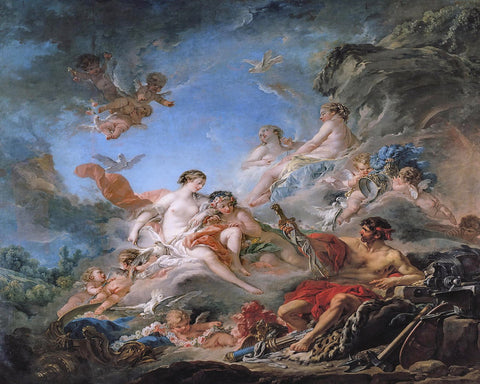
In Virgil's epic Aeneid, Venus tempts Vulcan and convinces him to produce weapons for her child Aeneas.
Boucher's painting shows Vulcan offering the goddess a sword; at his feet are two putti playing with a plumed protective cap, and near him is a shield and defensive layer.
This work was a starter sketch for a woven artwork —one of a set appointed to four unique artists by the marquis de Marigny, a compelling arts chairman under King Louis XV. Who appointed François Boucher, Louis Michel Van Loo, Jean-Baptiste Pierre, and Joseph-Marie Vien to create a progression of four paintings dedicated to the loves of the divine beings, as fabrications for Gobelin embroidered works of art.
This distinctive and colorful small painting is framed with an embroidered structure, which was displayed at the Paris Salon of 1757. This painting was portrayed as brimming with warms, and it's without a doubt, loaded up with zealous colorful brushstrokes. It's was one of the most loved of Boucher's works. This adaptation shows the occasion in the eighth book of Virgil's Aeneid.
Top 10 Most Famous Paintings by Sandro Botticelli
Venus Consoling Love by François Boucher
The painting delineates a fanciful scene, where Venus, the goddess of Love, is portrayed as a beguiling Cupid. She is going to seduce Cupid and remove the arrows that he utilizes when taking shots at individuals to make them experience the feeling of love.
Venus sits alongside the river with white birds at her feet and pearls in her hair. She has lavish silk draperies that are somewhat folded over her.
Boucher painted the artwork with delicate pastel tones utilizing a diminished shimmering light technique. Mme de Pompadour authorized the painting and is supposedly the one who modeled for the painting. However, it has even been suggested that Boucher's young spouse was the young lady modeling for the figure of Venus.
The painting is charming and engaging and was shown at Château de Bellevue when it was finished. The chief appeal of Rococo art is its arousing quality and alluring state.
Top 10 Most Famous Paintings by Henri Matisse
Madame Bergeret by François Boucher
Madame Marguerite Bergeret was the spouse and sister of two of the eighteenth century's most vigorous art collectors: Her sibling, the Abbé Jean Claude de Saint-Non who ventured out to Italy with Hubert Robert and Jean-Honoré Fragonard. And her husband, Jacques Onésime Bergeret, a well off trader, turned into a trusted authority figurer.
During the 1740's Boucher was creating a name for himself as a Rocco painter in Parisian art circles. This is one of the paintings that helped him grow to new heights as an artist. Boucher's artistic talents were immediately seen by the King's new courtesan Madame de Pompadour. Whereafter, Boucher turned into her preferred painter, and he created a few portraits of her.
Madame Bergeret is depicted in a closed-off landscape setting, wearing a smooth silk dress, which has puffed sleeves highlighted with blue stripes. Her face sparkles with youth and magnificence portrayed by translucent white colors.
The most significant theme, and the appeal of the composition, is the abundance of roses - rising out of a bronze container, also on her sleeves and hair, and on the ground and bench next to her.
Top 10 Most Famous Paintings by Andy Warhol
The Brunette Odalisque by François Boucher
Odalisque initially alludes to a female slave or courtesan. However, in this painting, it's utilized as a term portraying the sexual and sensual interest which was normally among Rococo portraitures during the rule of King Louis XV of France.
Tragically, not all of France was persuaded by the lighthearted suggestion showed by Rococo artists, including Boucher.
His harshest pundit, Denis Diderot, blamed Boucher for basically undermining his own significance in the art world. Saying that Boucher's art was, "such a pleasing bad habit."
Madame Boucher was the model for this painting.
Top 10 Most Famous Paintings by Georgia O'Keeffe
The Interrupted Sleep by François Boucher
The straightforwardness of the subject gives a false representation of the multifaceted nature of this composition. It was created around a progression technique of focusing on the subjects. It was appreciated at the Salon of 1753, this painting was one of a couple.
Top 10 Most Famous Paintings by John William Waterhouse
Portrait of Marie-Louise O'Murphy by François Boucher
Marie-Louis O'Murphy was a youthful escort of the King. This painting was authorized when she was just fourteen years old, and when it was introduced to the King, he immediately accepted her as one of his concubines.
She soon after delivered to him a little girl, Agathe. After just two years at court, she incautiously attempted to unseat her adversary, the King's fancy woman Madame de Pompadour.
Top 7 Most Famous Paintings by Frederick Carl Frieseke
Mill at Charenton by François Boucher
The village of Charenton, at the Seine and Marne waterways, was one of the most loved areas in the eighteenth century as a vacation spot for royal people looking to get away from Paris. This specific location is perceived as one of the pleasant mills in the Charenton region.
The painting is encumbered with the feeling of nature: the trees are abundant with foliage, the water stream has brambles, and a large number of white pigeons are flying around the mill. Shimmering white highlights breath life into the lavish summer scene. The occupants of this ideal world are maybe as whimsical as the plants themselves, they are impeccably dressed for working laborers.
Top 7 Most Famous Paintings by Eugene-Louis Boudin
The Bird Catchers by François Boucher
François Boucher depicts youthful couples in the act of catching the birds. During the 1700s, little birds were considered a significant symbol in the romance custom: the endowment of a confined bird from a man to a lady connoted her to his heart.
The Bird Catchers was a succession of interlinked artworks known as the Noble Pastorales. In the end, the sketches were cut up into areas and sold independently. The reconstructed artwork uncovers how enormous the design initially was and what is absent.
Top 15 Most Famous Paintings by Paul Cézanne
Venus at Vulcan's Forge by François Boucher
This painting depicts the heart of Virgil's story in the eighth book of The Aeneid, wherein Venus urges Vulcan to produce arms for her human child Aeneas. Vulcan introduces the sword toward Venus and seems seized with enthusiasm and is under the influence of Venus.
Top 10 Most Famous Paintings by John Singleton Copley
The Setting of the Sun by François Boucher
Referring to the time of the day, Boucher presents a marvelous composition layered with purposeful anecdote and imagery.
In The Setting of the Sun, the god Apollo comes back to his mother's arms, carrying nightfall alongside him, he is painted using pinks, tans, and creams.
A closer view of the subjects showcases various fairies and naiads covering each other as if they where cloth themselves.
Top 10 Most Famous Paintings by Thomas Cole
Boreas Abducting Oreithyia by François Boucher
The painting is the story told by Ovid in the 6th book of the Metamorphoses: Not winning the hand of the stunning Athenian princess, Orethyia, of King Erechtheus. Boreas the wind god of the north, chooses to return to his actual nature of cold fierceness. Boucher elegantly depicts the wind god's energy and fierceness of the story.
The Rising of the Sun by François Boucher
The Rising of the Sun and its pair, The Setting of the Sun were both private commissions ordered by Madame de Pompadour for the Gobelins Collection. In The Rising of the Sun, the god Apollo climbs into the sky with arms outstretched, leaving the endlessly nighttime murkiness.
The turquoise sky represents the lucidity of the day, the solid light of the morning brought in to being by Apollo. A closer view of the canvas shows nude groups of sprites and naiads, somewhat reaching out to Apollo. Symbolically trying to get light from him.
The paintings were finished in 1754 & 1755 and hanged in the king's room at château de Bellevue. They were sold together with the remainder of her collection on 28 April 1766 and went through four different collectors before being purchased on 2 August 1855 by Richard Seymour-Conway of Hertford. They currently hang at the Wallace Collection in London.
An Autumn Pastoral by François Boucher
"Autumn Pastoral" – one of the two paintings requested by the Finance Minister of Louis XV. The painting shows a youthful shepherd taking care of a woman, Lisette, with sheep nearby. He is feeding Lisette some grapes.
The other painting is entitled "Summer Pastoral". The inspiration for both of the paintings came from the writings of Sir Charles Simon Favard.
Pastoral scene by François Boucher
Boucher's pastoral paintings regularly delineate enchanted couples in rural settings, joined by friendly-looking animals. Here a young man seems to be trying to get the young woman to get up and go with him somewhere.
The Breakfast by François Boucher
A family of five is gathered around a small table and they seem to be enjoying a hot beverage. Some researchers think that Boucher was depicting his own family, his wife (on the right), his two kids, and his sister (on the left) who seems to be taking care of his youngest child.
The Milliner by François Boucher
The fine silky drapery which encompasses these two ladies gives an air of extravagance to this painting. We are given a cozy scene where both seem to be having a delightful conversation.
The room is outfitted with a tall window which allows the natural light to come in and be reflected on both the subjects.
Madame de Pompadour at her Toilette by François Boucher
The subject of Boucher's painting is Marquise de Pompadour. She lifts a rouge-shrouded brush to her face, attracting the watcher's eye to her impeccably coiffed hair and ruddy cheeks. Boucher renders his subject with delicate, cloudy brushwork, causing her to seem illusory and ethereal.
François Boucher Paintings For Sale!
- Les Confidences Pastorales by François Boucher
- Shepherd's Idyll by François Boucher
Check out these Famous Artists who have shaped the art world!
If you like this article, please share it with others, so perhaps they can also enjoy it and get value from it. Any of the artwork purchased on ATX Fine Arts accommodates me as an artist/ writer along with helping the site grow organically, thank you.


